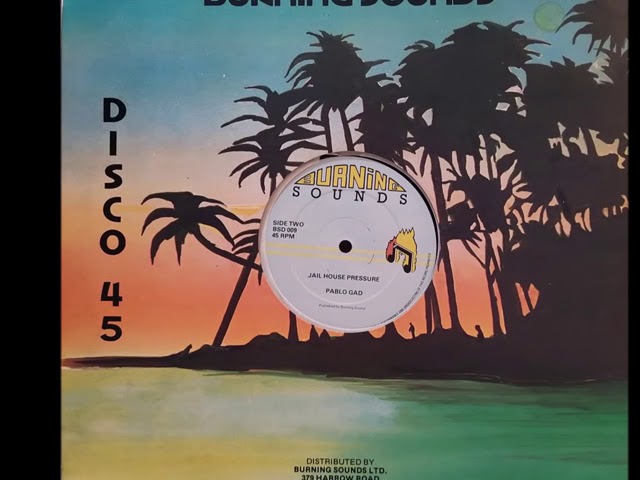Pablo Gad – Bloodsucker / Jailhouse Pressure – Burning Sounds Records – 1978
Uploaded today is an extended play 12″ record by Pablo Gad, ‘Bloodsuckers’ on the A side and ‘Jailhouse Pressure’ on the B side. ‘Bloodsuckers’ is an absolutely monster track with a dub mix strong enough to knock down walls. ‘Jailhouse Pressure’, although musically just a tad slower, this cut still hits the UK-based-reggae-wise sweet spot!
Marvellous stuff.
Most of the text below about Pablo Gad was written by Adrian Sherwood lifted off of the sleeve notes for the absolutely brilliant ‘Don’t Call Us Immigrants’ UK reggae compilation album, released on Pressure Sounds Records, two decades ago now, back in 2000. The fact the informative liner notes are written by Pressure Sounds label founder and modern dub avatar Adrian Sherwood is a sure sign of the historical importance attached to this compilation. The music on ‘Don’t Call Us Immigrants’ marks the emergence of the original wave of U.K. reggae bands, many of them the children of the original post-WWII immigrant wave from Jamaica to the U.K. It features the first-ever recordings by Steel Pulse and Aswad, chronicles the emergence of Dennis Bovell as a producer and major creative force with Matumbi and others, and spotlights U.K. scene mainstays like Misty in Roots, Black Slate, Pablo Gad and Reggae Regular. It is the soundtrack to a period of forging musical and personal identities and overcoming the purist prejudice that valid reggae could only come from Jamaica. ‘Don’t Call Us Immigrants’ is 100 percent crucial for anyone seriously investigating the global facets of reggae history — after all, this was the first major offshoot to develop out of Jamaican reggae’s worldwide explosion in the Seventies.
Born in Jamaica, Pablo Gad was a friend of Augustus Pablo and his brother Douggie Swaby. He followed their sound system, El Rockers and was also hugely influenced by King Tubby and Emperor Faith Sounds. Pablo came to the UK to live in 1974.
In 1977 Pablo Gad was introduced to Joe Sinclair by his benefactor Winston Fergus. Sinclair had set up the Klik record label following his departure from Trojan Records with a view to releasing authentic Jamaican sounds. Both Fergus and Gad were British-based but were able to maintain an appeal within the roots market. Fergus was the lead singer of the Equators who provided the backing to Gad’s debut recordings. Both 7” singles surfacing on the Caribbean Records subsidiary and both; ‘International Dread’ and ‘Kunte Kinte’ enhanced his position as a top vocalist. ‘Kunte Kinte’ featured Lloyd Charmers on backing vocals and Eddy Grant on guitar.
In 1978 Gad emerged with the classic ‘Blood Suckers’, which surfaced through Clement Bushay’s Burning Sounds empire. From the opening bars this rhythm was destined to last, and was enhanced by Gad’s vocals, with his delivery reminiscent of Fred Locks.
Further singles surfaced through Bushay, including ‘Natty Loving’, ‘Trafalgar Square’, ‘Throw Your Dreams’ and ‘Riddle I Dis’. The album ‘Trafalgar Square’ was also released on Burning Sounds Records in 1979. The success of ‘Blood Suckers’ overshadowed his later output though, which probably inspired the revival of the rhythm for ‘Hard Time’.
The outcome of ‘Hard Time’ was another smash hit that has become an anthem for revival DJs.
Pablo Gad had gone back to Jamaica for a visit in 1979. On returning to England it struck him how almost everyone seemed to be complaining about how hard things were. Having just witnessed a whole different kind of suffering in Jamaica, he wrote ‘Hard Time’ to let people realise that their lot in life was not as bad as it seemed. “They at least got their rent paid and their Giro every week”.
‘Hard Times’, the album, was released in 1980 and Pablo Gad went on to win two gold discs for best male vocalist and best album presented to him by Black Echoes readers.
Pablo gad toured regularly and would work with Black Slate as his favourite backing band. Black Slate’s Ras Elroy played bass on the ‘Hard Times’ album with Keith and Tony Douglas on harmonies and Mark Lusardi as engineer.
1980 was a prolific year when a successful run of hits encompassed ‘Guns Fever’, ‘Nursery Rhyme’, ‘Oh Jah’ and ‘Fly Away Home’. Pablo Gad continued to record in the 90s, including the self-penned ‘Johnny Reggae’ and the haunting ‘Lash On My Back’, the latter being featured on the Brixton-based Lion Roots compilation. The “Best of Pablo Gad” compilation album on the Reggae On Top label in 1993 featured his early singles. He recorded with the Conscious Sounds label with The Bush Chemists.





